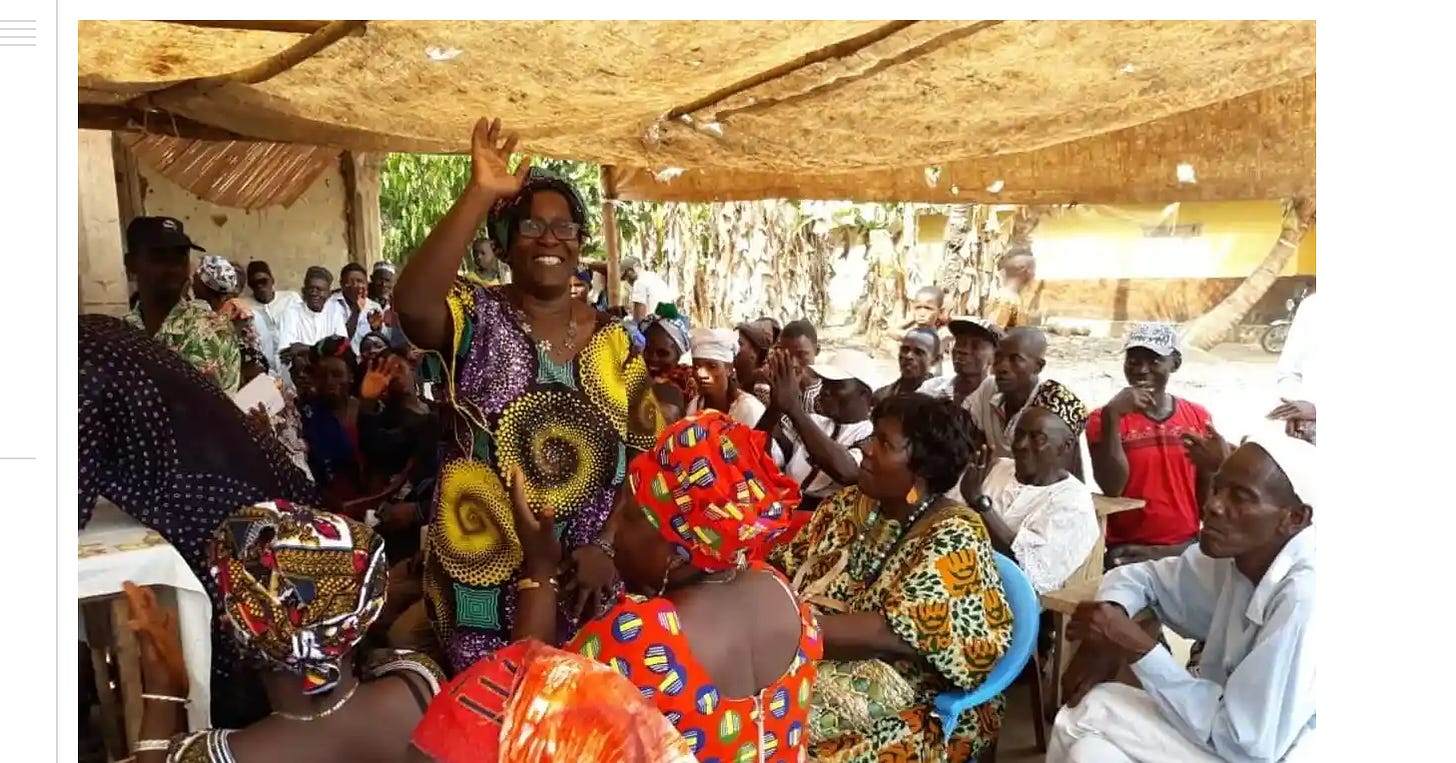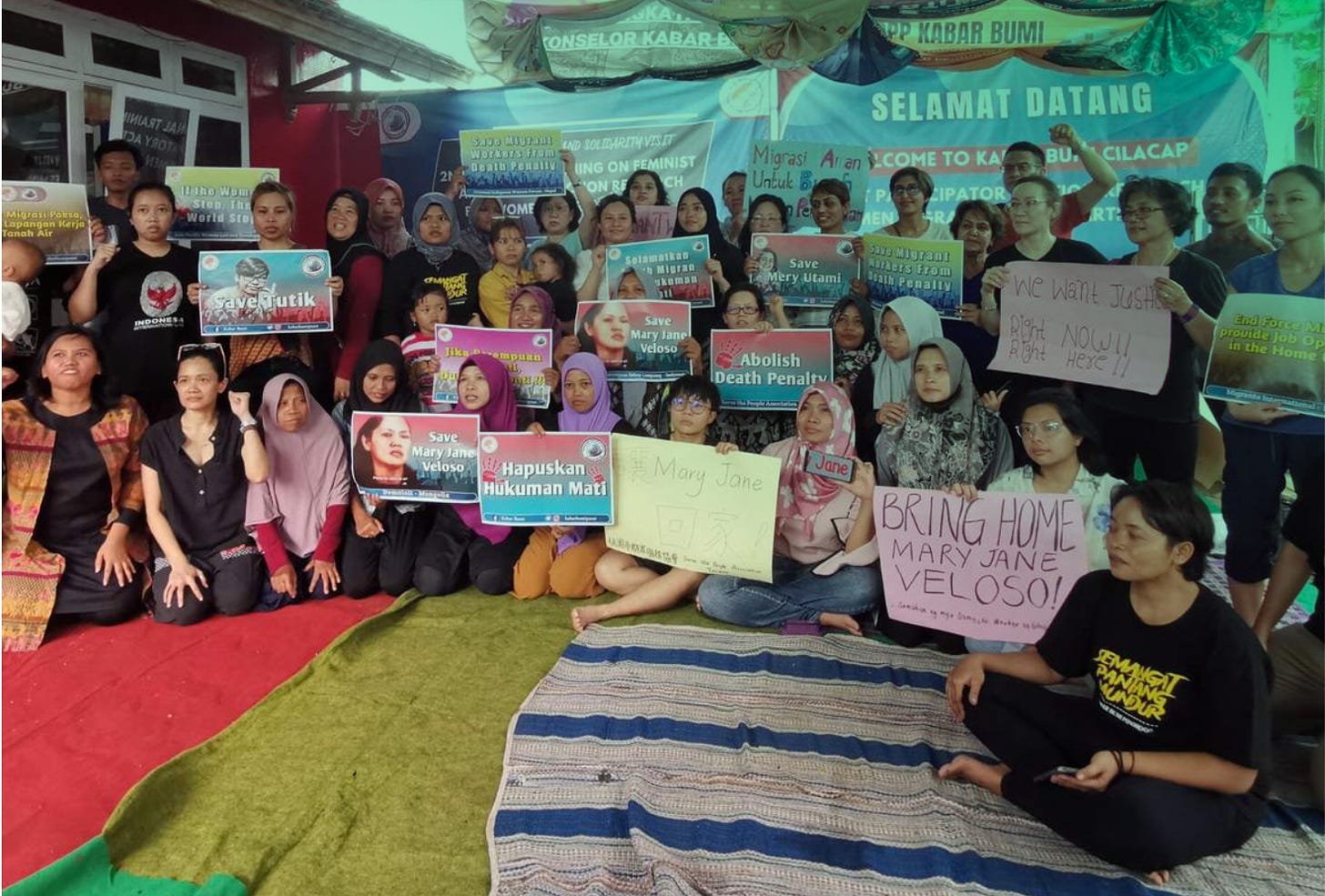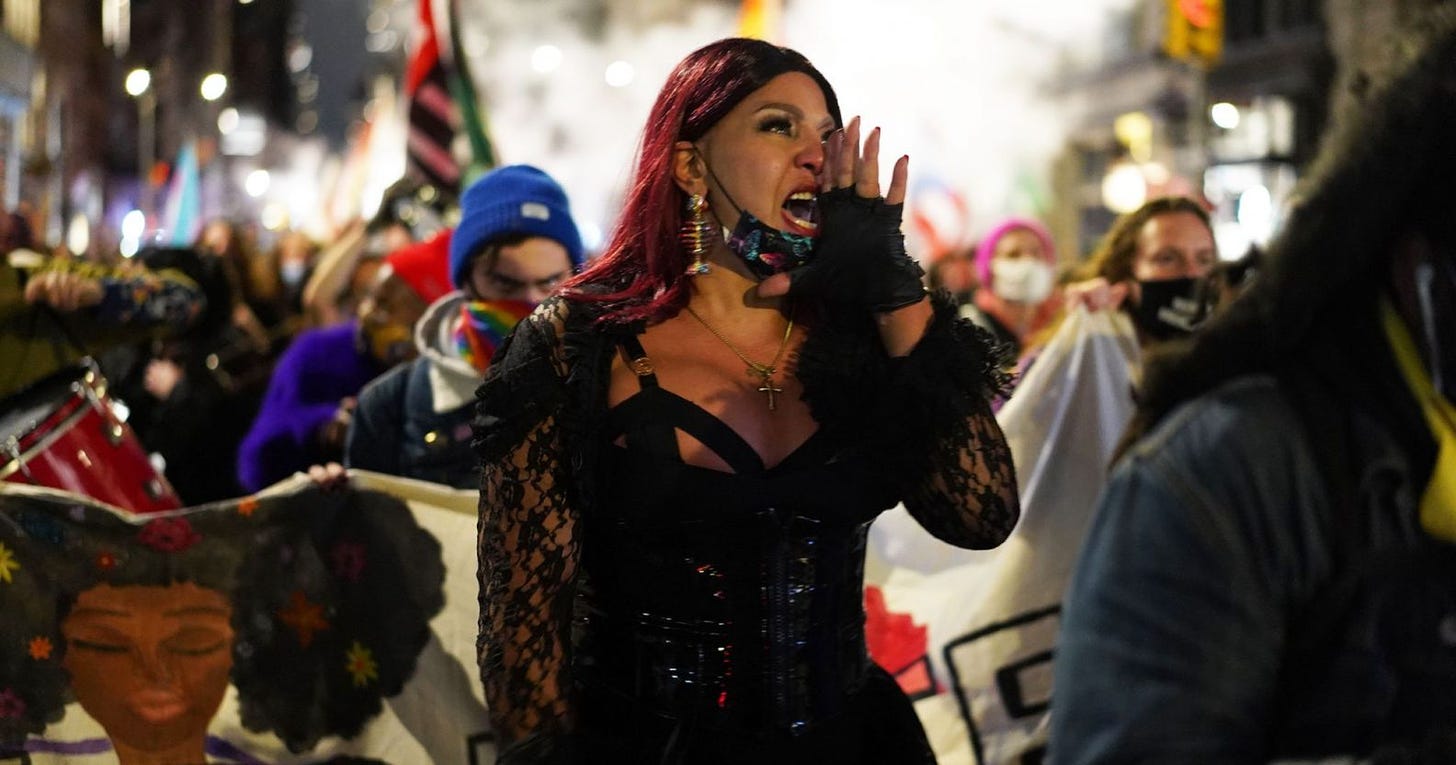Global Roundup: Sierra Leone Women in Politics, Kazakhstan GBV Docudrama, Indonesian Women Migrant Workers, Trans Woman Saving Trans Lives, First Woman & LGBTQ Archery Brand
Curated by FG Contributor Samiha Hossain
Photograph: Freetown city council
The Unity party, registered by Femi Claudius Cole in 2017, failed to win any seats in the 2018 general election. But Cole persevered, travelling around the country offering medical treatment with a surgeon, giving interviews and building up a social media following. In 2021 she co-founded the Consortium of Progressive Political Parties, an opposition alliance. In July 2022, when women organising a rally to protest at the soaring cost of living asked for her backing, she agreed, allowing them to make placards in her office. They planned to dress in black and hold a prayer service. But the day before the rally, armed police surrounded Cole’s house and she was accused of inciting the protests and detained for four nights. They also confiscated her passport, which has yet to be returned.
When the nationwide “Black Monday” protests, which also involved a strike by businesses, street traders and public transport, went ahead the following day, 54 women were arrested in Sierra Leone’s capital, Freetown, for participating in an illegal gathering (although Cole says they had sought permission to march). Other women were beaten and taken to hospital. The experience shook Cole but strengthened her resolve.
I was thinking ‘should I have discouraged the women from protesting, helped them to silence themselves?’ But I knew the women had a point and the constitution supports protest. So I came out way bolder, [thinking] I know the worst you can do to me. I realised I have a responsibility. I cannot now go into self-protection mode – I belong to these people. -Femi Claudius Cole
In January 2023, the gender equality and women’s empowerment bill became law, stipulating that 30% of candidates for elected positions and 30% of presidential appointees must be women. Currently only 13% of MPs, and 17% of ministers are women. However, the law says the president “may” appoint women to 30% of positions, which gives the president a get-out cause when it comes to appointing ministers and other key roles such as ambassadors. There are also concerns that nominees will not necessarily be elected, especially since the election on 24 June will be based on proportional representation for the first time. Money is another barrier for women, says Cole, as candidates have to pay more than 3,600 new leones (£128) to get on the ballot sheet.
Even if the minimum 30% target is achieved in both elected and appointed positions, women say the country has a long way to go in addressing sexist attitudes, especially towards women in power. Catherine Zainab Tarawally, an opposition MP from the north, says she is often told to “get back in the kitchen”. Advisor to the female caucus and chair of the gender affairs committee, she says she survived her first term in parliament by giving as good as she gets.
Sierra Leone is a patriarchal and chauvinistic society. Women make up 52% of the country but we are still fighting to grasp what is ours…They call me the iron lady – if I want something, I fight for it. -Catherine Zainab Tarawally
“Zhalgyz Emessin” is a Kazakhstani docudrama series produced by Trinity Production Centre in collaboration with UN Women Kazakhstan and the Spotlight Initiative Regional Programme for Central Asia and Afghanistan, with support from the European Union and the Government of Kazakhstan. The nine-episode series features real-life stories of domestic violence survivors who have overcome difficult situations.
The series aims to increase awareness about how to stand up against gender-based violence and challenge gender stereotypes, norms and beliefs. It empowers survivors and calls on everyone to do their part to eliminate gender-based violence in Kazakhstan, while sharing key messages of the Generation Equality Forum Action Coalition on Gender-Based Violence and the Spotlight Initiative.
Each of the characters of the series has a different life story, but all of them once found themselves in a difficult situation. Each series provides contact information for hotlines, infographics and important facts about the problem of gender-based violence around the world and in Kazakhstan.
Unfortunately, recently we have been hearing more and more often in the press about egregious cases of violence that occur in Kazakhstani families. With this project, we wanted to show that violence is not a norm, that it is impossible to keep silent about it, and that this topic is important and necessary for society. -Sandugash Rakhimzhanova, Executive Producer of the series
The documentary drama combines actors’ performances with experts’ interviews, providing evidence-based cases and recommendations.
Photo by Anne Marxze Umil/Bulatlat)
In a community in Cilacap, Central Java in Indonesia, many women were victimized by the confiscation of documents by recruitment agencies. Cilacap is said to be one of the main areas of origin for women migrant workers from Central Java, Indonesia. In 2020, a feminist participatory action research (FPAR) conducted by Kabar Bumi, an organization of migrant workers and their families, showed that this practice has severely affected returning women migrant workers in Indonesia. Without these documents, the women are not eligible to apply for government welfare and assistance programmes, unable to register themselves to continue their education and unable to apply for land certificates, for example. Migrant workers are forced to surrender these documents, which may include passport, birth certificate, marriage certificate, ID card, family card and diploma, until they have paid the agency through salary deductions. The study revealed an estimated nine million Indonesians working abroad. At least 65 percent are women and the majority are employed as domestic workers.
Elin Anita Awaliyah, 35, shared her struggle with a recruitment agency that withheld her documents when in 2019 she was terminated by her employer after only just a month in Hong Kong. Awaliyah, a victim of domestic abuse, said she was told to pay 15 million Indonesian rupiah ($976) as penalty for not finishing her contract. She sought the help of Kabar Bumi, whom she knew through her sister-in-law, and she was able to get her documents back and also did not pay the said penalty.
The government will not do something if we will not be vigilant and push them to do the right thing. They often act in favor of the agencies. We do not pin our hopes on the government. We fight on our own. -Iwenk Karsiwen, chairperson of Kabar Bumi
Based on FPAR, the majority of migrant workers and their families are not aware that legal document confiscation is illegal and violates their rights. With this, Kabar Bumi organized a series of training and education workshops to help build the capability of women in the community to handle cases related to document confiscation. Not only this, they also assisted in cases such as human trafficking, overcharging, vaccination access and data forgery by recruitment agencies. The group were also able to broaden their network with migrant organizations in Indonesia and destination countries to “strengthen the solidarity for migrants’ rights.”
Photo: DJ Lehrhaupt
Le Caire grew up in Egypt, with a family whose journey towards conservatism put her in danger as she began to figure out her gender identity. Despite living in ‘survival mode’, Le Caire says she was a “happy person” fighting for a future where she could live as her authentic self. She dove headfirst into dance to “hold onto something”, and it was this that would eventually help her to escape Egypt.
Through dance, Le Caire was able to get a temporary visa to travel to New York City in 2008, where she applied for asylum. Alone in the city and scared for her life, she struggled to communicate with people. Her English wasn’t great at first, and she found herself homeless for a while. Then, she fought drug addiction while trying to survive. Eventually, Le Caire found solace and safety in her relationship with her now husband. It was during this time that she was able to ‘heal her soul’ and explore her trans identity.
I wanted to heal my inner child. I wanted to heal this girl that has always been there with me, and also my ancestors … they treated them like kings and queens to be gay or to be transgender, in ancient Egypt. -Iman Le Caire
Le Caire had a political awakening after the death of George Floyd. She says the issues that fuelled that summer’s Black Lives Matter protests brought to mind the discrimination and abuse trans people face abroad, and it inspired her to fight for her sisters worldwide. She founded Trans Asylias in 2021 to help trans people persecuted in their home countries find asylum. She has since helped 10 people from places like Saudi Arabia, Jamaica, Syria, Yemen and Egypt find safety.
Through her organisation, Le Caire helps check through trans people’s asylum applications, gives them advice and raises money to fund their relocation to countries like France, the Netherlands and Canada.
Iman Le Caire’s work is crucial at a time when some countries, like the UK, are hostile towards asylum seekers. Le Caire says it’s “very hard” to hear such hostility towards asylum seekers. She says it’s particularly “frustrating” because it shows how political leaders are failing to understand the very meaning of the word “asylum”. An asylum seeker, she underlines, is somebody seeking protection from persecution and serious human rights violations in a country, and this includes LGBTQ+ people fleeing discrimination.
Kendall Tichner.Wild Captives
Wild Captives founder and CEO Kendall Tichner is bringing a distinctly new approach to the male-dominated world of archery at her demo space in Brooklyn and on social media with content that is fun, friendly and inclusive. On TikTok, where she has nearly 600,000 followers, some of her most popular videos show her extinguishing a flame with a well-aimed arrow or hitting flying targets, like a balloon that explodes into a burst of feathers in the sky. Her trick shots have racked up tens of millions of views.
At the beginning of the pandemic, Tichner picked up a bow for the first time since summer camp. She made a video of herself playing around at an archery range and posted it on TikTok, which went viral. People online were asking her for recommendations, and companies reached out about sponsorships and brand deals. But when she investigated the options, nothing spoke to her.
[Women and the queer community] were just being left out of the whole marketing narrative. If you saw a woman, it was the wife of the shooter, and even she was, like, next to a dead bear. -Kendall Tichner
As Tichner’s community of followers grew, they wanted more — and not just videos of her, but a way to get involved themselves. She decided to create her own archery kit, with everything a beginner would need to get started in their own backyard. She quit her job to focus on her company in 2022 and now has a team of five part-time employees.
I don’t want to generalize but in terms of queerness, it made me in touch with my body and femininity in a way that felt really powerful, even though I’m a tomboy. -Kendall Tichner
The comments on some of Tichner’s videos are a mess of toxic masculinity and mansplaining. One commenter recently reassured another not to worry about women subverting traditional gender roles because “they’ll end up alone anyway and die off. Evolution.” And if they’re not criticizing her form, they’re questioning her sex appeal. But Tichner said she doesn’t let it get to her, rather she focuses on empowerment.
[The queer community is] really into fantasy. We’re drawn to cosplay because some of us have had to pretend our whole lives. Maybe we’ve had to escape reality and now we’re reclaiming it. There’s something heroic about shooting a bow and feeling really strong. And being your own hero, you know? -Kendall Tichner
Samiha Hossain (she/her) is a student at the University of Ottawa. She has experience working with survivors of sexual violence in her community, as well as conducting research on gender-based violence. A lot of her time is spent learning about and critically engaging with intersectional feminism, transformative justice and disability justice.
Samiha firmly believes in the power of connecting with people and listening to their stories to create solidarity and heal as a community. She refuses to let anyone thwart her imagination when it comes to envisioning a radically different future full of care webs, nurturance and collective liberation.






